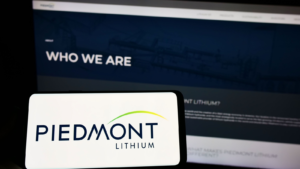Governments worldwide are implementing policies to reduce carbon emissions and move away from fossil fuels. So, the shift towards electric mobility and renewable energy storage is expected to accelerate, perhaps faster than some investors anticipate today.
These three lithium stocks can potentially offer significant returns to investors who are looking to capitalize on the burgeoning demand for this commodity. China is a key market for lithium and has seen some economic tremors over the past couple of years. But, this may be a short-term and crucially, not a structural weakness in the market, meaning it could be a ripe opportunity for investors to pick up shares in lithium companies.
Albemarle (ALB)

Albemarle (NYSE:ALB) stands out as a global leader in lithium production.
Now could be an ideal time to scoop up shares in ALB. In 2023, the company reported net sales of $9.6 billion, marking the highest in its history with a 31% increase. For 2024, ALB plans to lower its capital expenditures to between $1.6 billion and $1.8 billion. Significantly, that’s down from approximately $2.1 billion in 2023.
This reduction is part of a broader strategy to re-phase growth investments and optimize cost structures. It aims to unlock more than $750 million of cash flow in the near term. The company focuses on completing key projects like the Meishan and Kemerton lithium conversion facilities. Further, ALB prioritizes permitting activities at the Kings Mountain spodumene resource.
The company’s shares have experienced volatility, with a notable decrease in value over the past year, attributed to fluctuating lithium prices and market dynamics. Despite this, the stock’s twelve-month target prices range from $120 to $403, with an average prediction of $193. This indicates a potential upside of 60% from its current price.
American Lithium (AMLI)

Recently, American Lithium (NASDAQ:AMLI) updated its Mineral Resource Estimate for the Falchani Lithium deposit in Peru, markedly increasing its contained lithium. After taxes, it’s estimated to be worth $5.11 billion.
A string of good news for AMLI stock has ensued lately. For instance, last year its stock price soared by more than 16% after the company announced completion of an investment in another company called Surge Battery Metals (OTCMKTS:NILIF). With this, American Lithium now owns almost 10% of Surge. Also, they received 13.4 million units of Surge in return, which greatly synergies with AMLI stock’s business model.
Notably, AMLI is pre-earnings and pre-revenue, but it’s in a robust financial position with a current ratio of 10.7 and a market cap of just 150 million gives it plenty of upside potential. Additionally, the mineral resource estimate goes a long way to validating its worth as a long-term investment.
Piedmont Lithium (PLL)

Piedmont Lithium (NASDAQ:PLL) is another one of those lithium stocks that investors should consider as a long-term investment. However, one should treat PLL stock with caution. PLL’s stock plummeted by 9.7% last week, marking its lowest point since September 2020. The decline followed the company’s unexpected fourth-quarter loss, primarily attributed to a sharp decrease in lithium prices.
The company reported a net loss of $25.4 million for Q4, a significant swing from the $22.9 million profit recorded in the previous quarter. Also, revenues took a hit. PLL reported a negative $7.3 million for the quarter, largely due to the timing of revenue realization from shipments adjusted for the collapse in lithium prices.
However pessimistic this may sound, investors may never buy low and sell high if they avoid cyclical swings like this. One of the most effective (and risky) methods of earning substantial profits in the market is through being a contrarian.
The lithium markets will likely rebound, and with it trading at just five times sales and a positive forward P/E ratio, that recovery is set to come within the next twelve months. Investors could then scoop up undervalued PLL shares while they still can.
On the date of publication, Matthew Farley did not have (either directly or indirectly) any positions in the securities mentioned in this article. The opinions expressed are those of the writer, subject to the InvestorPlace.com Publishing Guidelines.
Matthew started writing coverage of the financial markets during the crypto boom of 2017 and was also a team member of several fintech startups. He then started writing about Australian and U.S. equities for various publications. His work has appeared in MarketBeat, FXStreet, Cryptoslate, Seeking Alpha, and the New Scientist magazine, among others.
